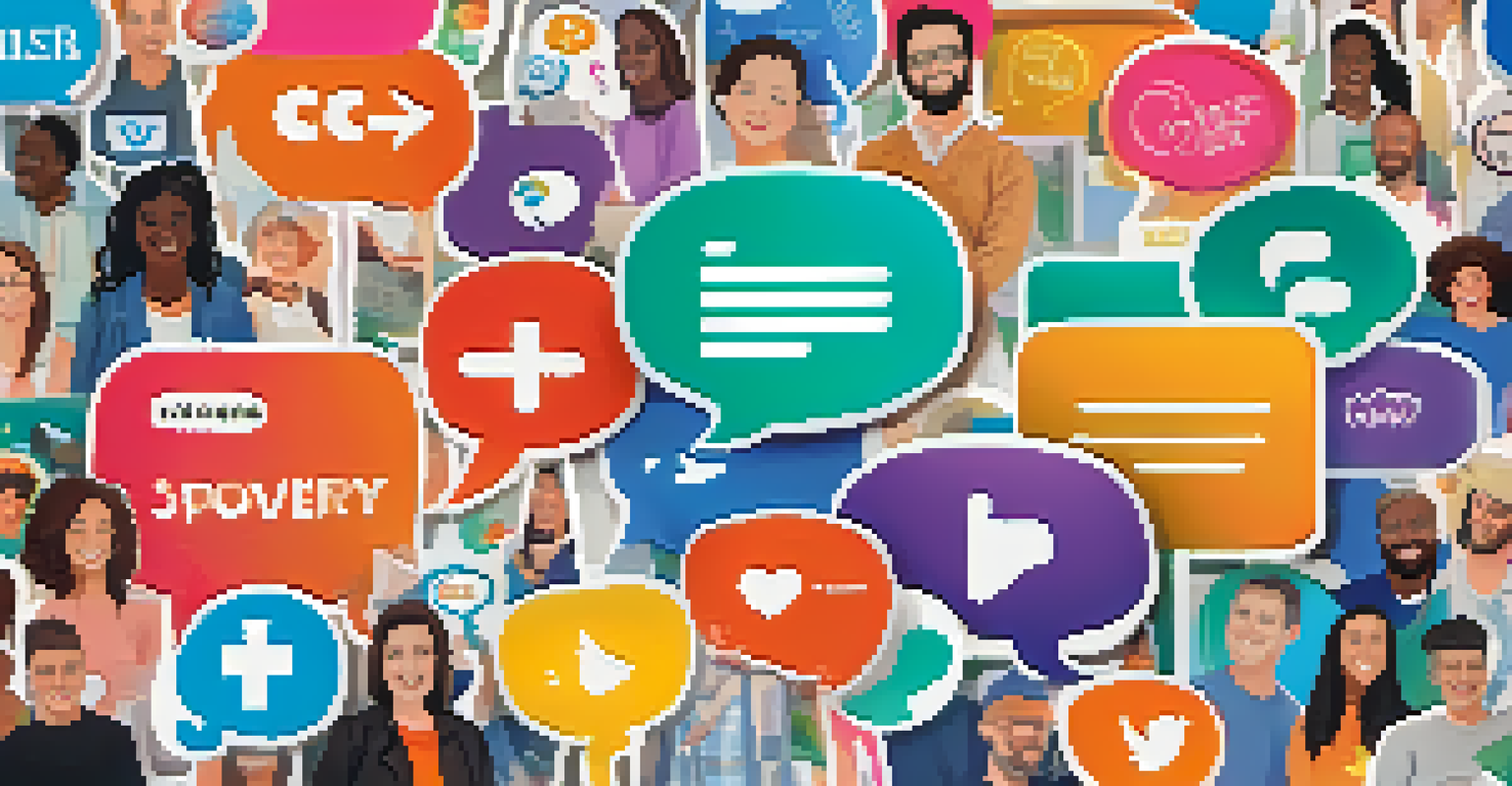The Role of Social Media in Mental Health Recovery Stories

Social Media as a Safe Space for Sharing
For many, social media serves as a sanctuary where individuals can share their mental health struggles without fear of judgment. Platforms like Instagram and Twitter provide a unique space to connect with others facing similar challenges. By sharing personal recovery stories, users foster a sense of community that can be incredibly supportive.
The greatest weapon against stress is our ability to choose one thought over another.
This safe space allows individuals to express their vulnerabilities, which can be liberating. The anonymity that social media offers can encourage people to open up in ways they might not feel comfortable doing in person. Such openness can lead to validation and understanding from others who resonate with these experiences.
Moreover, sharing these stories not only helps the individual but also inspires others who might be on their own recovery journey. It's a powerful reminder that we are not alone in our struggles and that healing is possible, nurturing a culture of empathy and support.
Building a Community of Support
Social media platforms have transformed the way we build and engage with communities, especially for those recovering from mental health issues. Online forums, support groups, and hashtag movements can create a sense of belonging. When people see that others are willing to share their stories, it encourages them to do the same, fostering a supportive network.

This community aspect is crucial for mental health recovery, as it offers a space to share coping strategies and experiences. For instance, groups dedicated to specific mental health challenges allow members to discuss their journeys openly. Such conversations can provide practical advice and emotional comfort, reinforcing the idea that recovery is a shared journey.
Social Media as a Safe Haven
Social media provides a judgment-free space for individuals to share their mental health struggles and find community support.
Additionally, these communities can combat feelings of isolation that often accompany mental health struggles. When individuals find others who understand their experiences, it can reduce stigma and promote healthier conversations about mental health.
Access to Resources and Information
In the age of digital media, social platforms are a treasure trove of information. They offer access to valuable resources like articles, videos, and mental health professionals who share tips and insights. This wealth of information empowers individuals to take charge of their mental health recovery.
Sharing our stories can be a powerful catalyst for healing, both for ourselves and for others.
For example, organizations often use social media to disseminate information about coping mechanisms, therapy options, and wellness practices. This democratization of information means that anyone with internet access can learn about mental health and recovery strategies. Such accessibility can be life-changing for those who may not have the resources to seek help in traditional settings.
Moreover, engaging with informative content can also spark curiosity and motivate individuals to explore new avenues for healing. By following mental health advocates and professionals, users can stay informed about the latest research and developments in the field.
Inspiring Change through Shared Experiences
Stories of recovery shared on social media have the power to inspire change and challenge societal perceptions around mental health. When people share their journeys, they humanize mental health issues, making them more relatable. This can help break down the stigma that often surrounds these topics.
For instance, when a public figure discusses their mental health struggles, it can lead to broader conversations that challenge stereotypes. Their vulnerability can encourage others to seek help and share their experiences as well. This ripple effect can foster a culture where mental health is prioritized and openly discussed.
Building Supportive Communities
Online platforms foster connections that help combat isolation and promote shared recovery experiences among users.
Furthermore, as more individuals share their recovery stories, it creates a collective narrative that emphasizes resilience and hope. These shared experiences can motivate others to believe in their own capacity for healing and growth.
The Role of Influencers in Mental Health Awareness
Influencers play a significant role in shaping conversations about mental health on social media. Many use their platforms to advocate for mental health awareness and share their own recovery stories. This visibility can reach a wide audience and make discussions about mental health more mainstream.
By openly discussing their experiences, influencers can offer relatability that resonates with their followers. Their platforms can serve as a launchpad for important conversations, encouraging others to prioritize their mental well-being. This visibility also helps normalize mental health discussions, making it easier for individuals to seek help.
Additionally, influencers often collaborate with mental health organizations, amplifying their messages and resources. Such partnerships can lead to campaigns that promote mental health awareness on a larger scale, creating a lasting impact on society.
Combating Misinformation and Stigma
While social media can be a powerful tool for recovery, it also has the potential to spread misinformation about mental health. It's crucial to discern credible sources from those that perpetuate harmful stereotypes. By promoting accurate information, users can combat stigma and foster a more informed community.
Mental health advocates often take to social media to debunk myths and share evidence-based practices. This proactive approach helps educate followers on what mental health truly entails, encouraging healthier perspectives. For example, addressing misconceptions about therapy can lead to more people seeking the help they need.
Influencers Drive Mental Health Awareness
Influencers play a crucial role in normalizing mental health discussions and inspiring others to prioritize their well-being.
Moreover, engaging in constructive discussions can help reduce the stigma that surrounds mental health issues. When users challenge harmful narratives, they contribute to a culture of acceptance and understanding, paving the way for more open conversations.
The Future of Social Media in Mental Health Recovery
Looking ahead, the role of social media in mental health recovery is likely to expand even further. As technology evolves, new platforms and features may emerge, providing innovative ways to connect and share experiences. Virtual support groups and mental health apps are just the beginning of what could be possible.
Additionally, as society becomes more aware of mental health issues, we can expect to see more diverse voices sharing their stories. This inclusivity can enrich the conversation, ensuring that various perspectives are heard and valued. It's essential for these platforms to continue promoting a culture of empathy and support.

Ultimately, social media has the potential to be a transformative force in mental health recovery. By embracing its power responsibly, we can create a future where individuals feel empowered to share their journeys and support one another in healing.